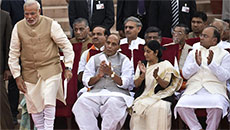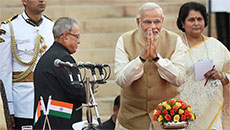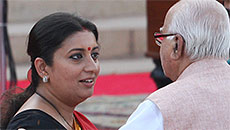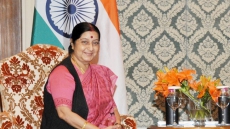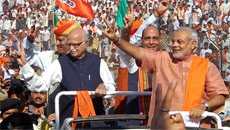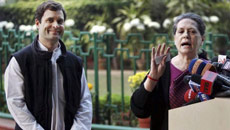Prime Minister Narendra Modi once again demonstrated that he is a man of the masses as he addressed millions of students and teachers across the nation and took questions from them in a first-of-its-kind live mass contact event on Teachers’ Day, striking a chord with them as he laughed and chatted and recounted events from his childhood.
Addressing an estimated 500 million students and others assembled in schools -- almost half the population of the country and comprising children aged below 18, along with thousands of their teachers and parents -- Modi spoke of how the value of a teacher has lost its sheen over the years and said that India could be a provider of good teachers to the world.
Speaking in Hindi in his usual chatty and conversational fashion, Modi addressed students for half an hour after which he took questions from them, including pointed ones on what his thoughts were on becoming PM and was he like a headmaster which people often said.
The event, which lasted from 3 p.m. to 4.45 p.m., was telecast through satellite link and live telecast on Doordarshan and the human resource development ministry website. Modi had introduced this practice in Gujarat several years ago and this was his attempt to bring another 'Gujarat model' on the national stage.
Besides breaking ice with students and teachers, the event also had Modi reaching out to their parents and families as he exhorted the children to play and sweat a lot, read biographies of great personalities, save electricity in many small ways and spoke of building toilets in every school to prevent girl students from dropping out. His captive audience on a busy weekday afternoon would be an estimated half the population of India.
His quotable quotes - “You should play and sweat a lot, at least four times a day. Promise you will do it,"; “Yes, I am a taskmaster. It is not that I do not work and (only) take work from others”; “Now that I am a prime minister, I have to watch my words” - had the children laughing along with him.
In effect, with his outreach the prime minister managed to overcome whatever negative feelings some school administrations had been harbouring for having to summon students and teachers in the afternoon for the address. Nearly all the schools invited at the Manekshaw Centre, in Delhi Cantt, where Modi spoke and those whose students rose to speak or ask questions were from government schools.
While many of the students, who were noticeably the pick of the school, addressed Modi in English, the prime minister invariably answered in Hindi.
Two visually impaired students also spoke at the event, including asking a question to Modi. Modi interacted through video conferencing with students at National Information Centres in Leh, Port Blair, Silchar (Assam), Imphal, Bhuj (Gujarat), Dantewada (Chhattisgarh) and Thiruvannamalai (Tamil Nadu).
Though Human Resource Development Minister Smriti Irani had assured that attendance of students in their schools for the event would be "completely voluntary”, the Delhi government education directorate had told schools that any "laxity in the arrangements shall be viewed seriously".
The Central Board of Secondary Education (CBSE) and state education departments had sent notices to schools asking them to make necessary arrangements for children to view the prime minister's address.
The CBSE, which has 12 million students across 12,504 schools, including 1,002 Kendriya Vidyalayas, 1,944 government schools and 8,966 independent schools, had in its notice said that suitable arrangements will need to be made to enable children to stay from 2.30 p.m. to 5 p.m. in the school Sep 5.
Schools have been asked to report back (through a Google form) on the arrangements made, and also on how it went off, after the show is over. Many morning schools had changed their schedule to later in the day to accommodate the address.
While students from remote schools as far apart as Jammu and Kashmir, Manipur, Chhattisgarh and Tamil Nadu were linked up with Modi and their students asked him questions, West Bengal was the lone exception as the state government said it had its own programme for the day and could not make the arrangements.
Prime Minister Narendra Modi Friday twice referred to his recent visit to Japan during his interaction with students on Teachers' Day to emphasise how spirit of cleanliness and egalitarianism was being inculcated in children there.
During his speech, Modi said he was told by an "Indian family" in Japan that students and teachers there together clean and mop up toilets.
"They said it was part of character building. How do we build national character," Modi said.
Referring to his Independence Day speech in which he referred to absence of toilets in some schools, particularly for girls, Modi said it was a very important task.
"I need help from every school. An atmosphere should be created," he said.
Answering a query, Modi recalled his visit to a primary school in Japan and said there was no teaching but 100 percent learning.
He said children were part of learning process and were very disciplined.
He also said parents do not come to drop their children to schools in their cars and there was a collective effort to usher children into school, ensuring equal treatment to all students.
"I noticed there was scientific temper in students. They have been nurtured in that manner," Modi said.
During his speech, Modi said he was told by an "Indian family" in Japan that students and teachers there together clean and mop up toilets.
"They said it was part of character building. How do we build national character," Modi said.
Referring to his Independence Day speech in which he referred to absence of toilets in some schools, particularly for girls, Modi said it was a very important task.
"I need help from every school. An atmosphere should be created," he said.
Answering a query, Modi recalled his visit to a primary school in Japan and said there was no teaching but 100 percent learning.
He said children were part of learning process and were very disciplined.
He also said parents do not come to drop their children to schools in their cars and there was a collective effort to usher children into school, ensuring equal treatment to all students.
"I noticed there was scientific temper in students. They have been nurtured in that manner," Modi said.
